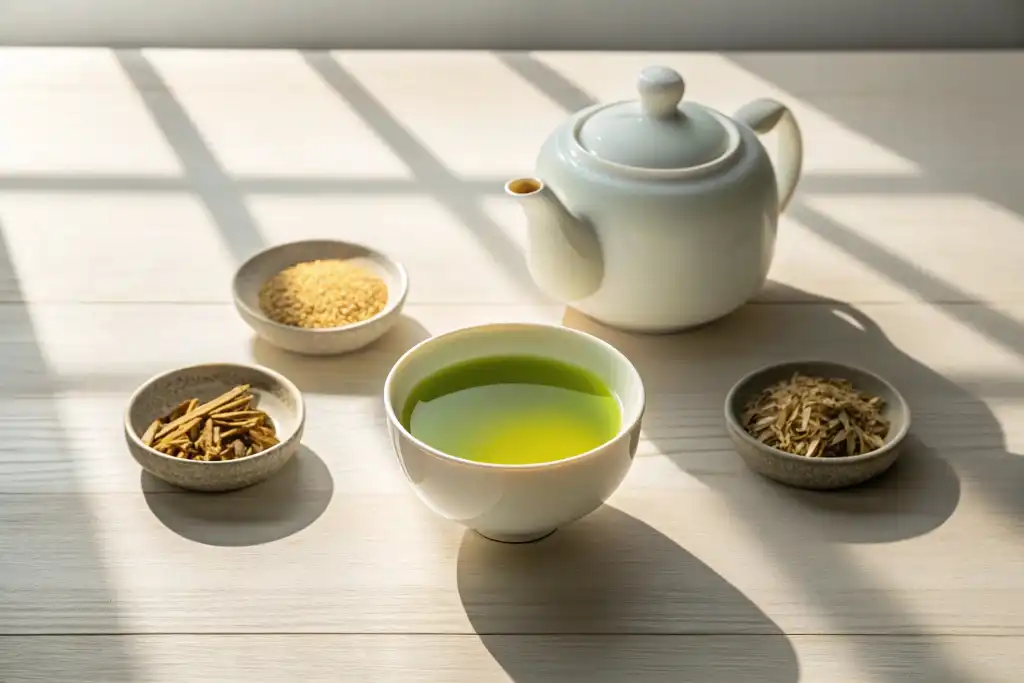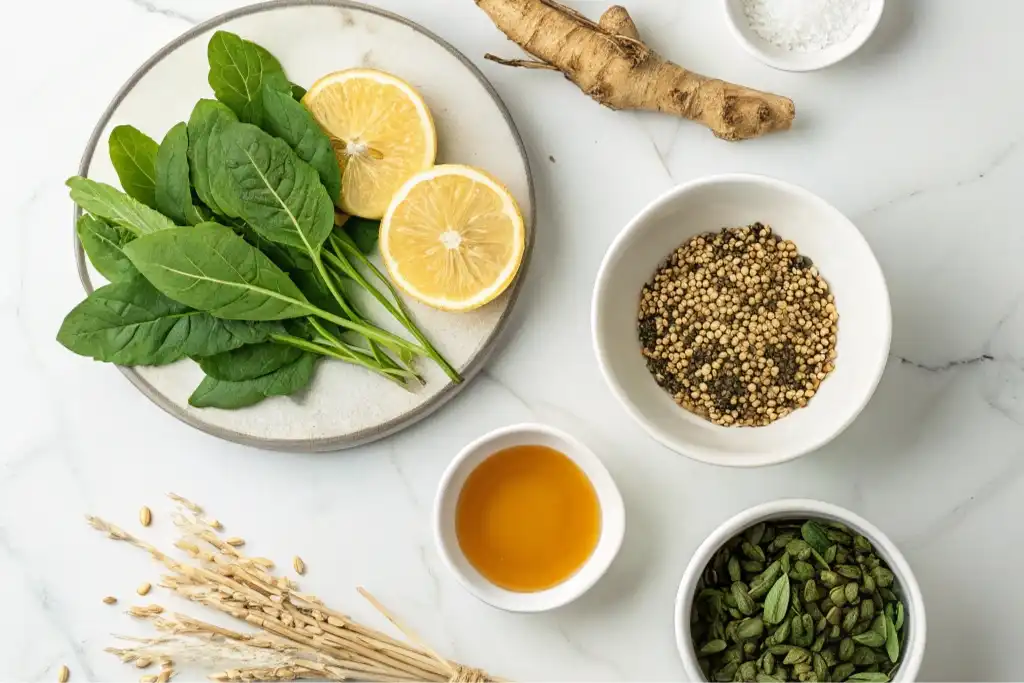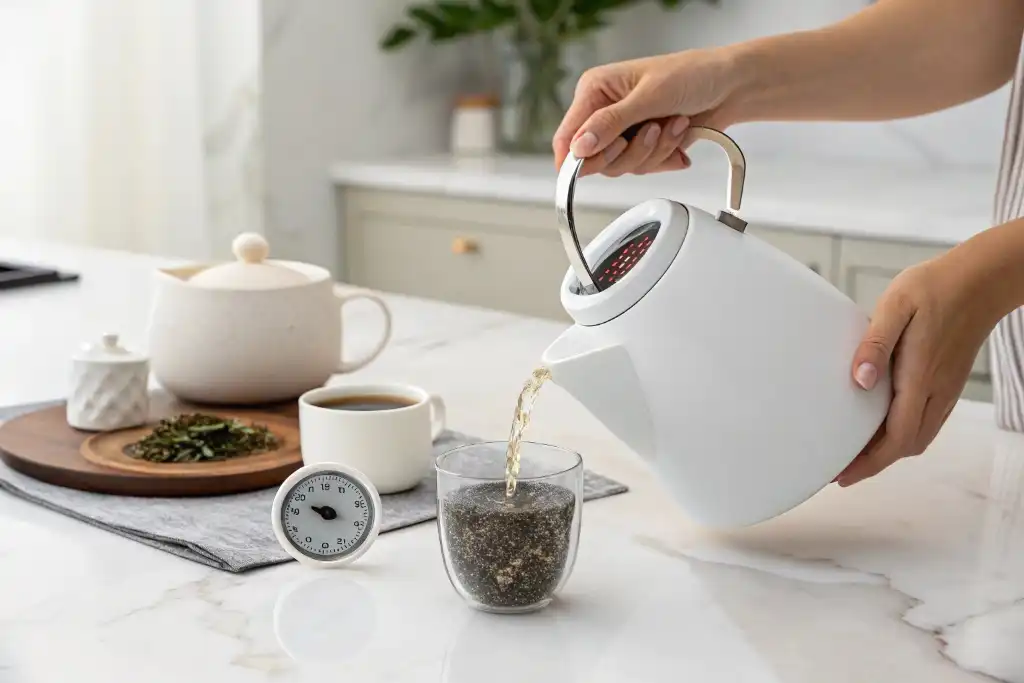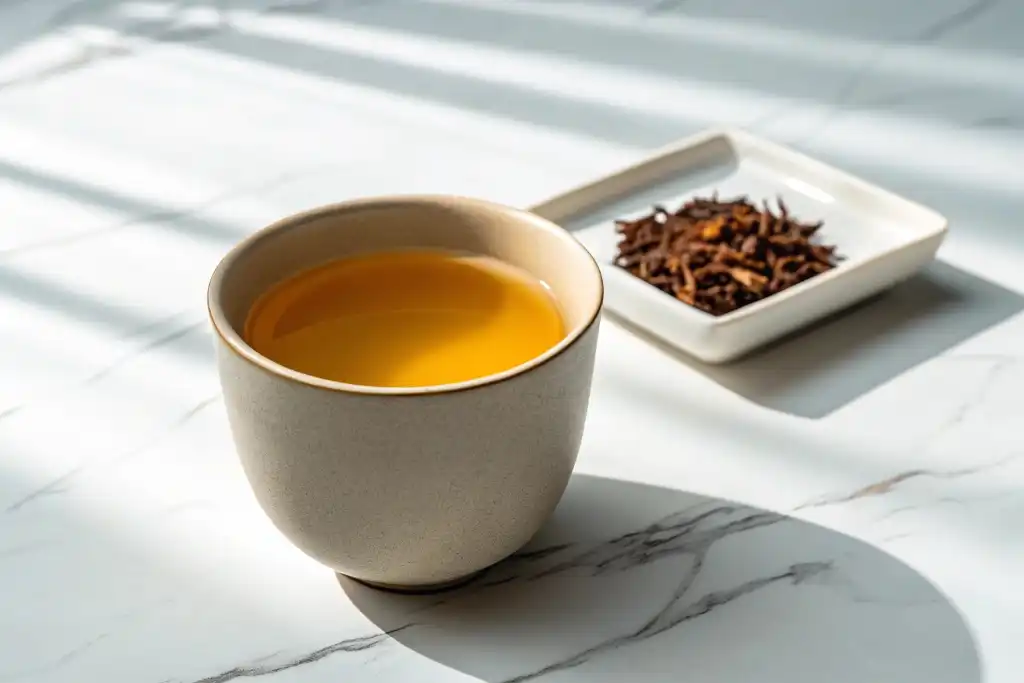There’s something magical about sipping a warm cup of Korean tea—it takes me back to cozy evenings with my grandmother, who always had a steaming pot ready. The delicate aroma, the comforting warmth, and the way each sip seemed to melt away the day’s stress—it was pure bliss. If you’ve ever wished for a simple way to relax and nourish your body, this is it!

Not only is this tea incredibly soothing but it’s also packed with natural health benefits. Whether you need a moment of calm, a gentle detox, or just a delicious warm drink, it’s the perfect choice. Plus, it’s so easy to prepare!
From floral to earthy flavors, there’s a blend for everyone. You’re going to love exploring the variety and finding your favorite! So, grab a cup, settle in, and let’s dive into the wonderful world of this timeless tradition.
Discover the Rich Heritage of Korean Tea
The Historical Journey of Tea in Korea
Long ago, tea arrived in Korea through China, but it quickly became more than just a drink. It turned into a cultural symbol, blending harmony, meditation, and hospitality. Buddhist monks played a huge role in spreading tea traditions, using it in ceremonies to promote mindfulness. Over time, royal families and scholars embraced it, making tea a refined part of society. Unlike in China or Japan, Korea developed a unique way of brewing and serving tea, emphasizing nature and simplicity. Even today, traditional tea houses reflect this history. Whether it’s a warm cup shared with loved ones or a peaceful solo moment, every sip connects to a rich past. Korean tea is more than just a beverage; it’s a story in a cup. If you love traditions and deep flavors, exploring these blends will be a treat.
How Korean Tea Culture Differs from Other Traditions
Tea culture in Korea is refreshingly unique compared to its Chinese and Japanese counterparts. While China focuses on artistry and Japan embraces strict rituals, Korea takes a relaxed, nature-inspired approach. Simplicity is key, and tea is enjoyed in a way that emphasizes tranquility. Traditional tea houses serve brews in minimalist ceramic cups, often paired with rice cakes or nuts. Unlike Japan’s matcha ceremonies, there’s no rush or pressure to perfect a method. Instead, it’s about enjoying the moment. Seasonal ingredients also influence flavors, making each experience slightly different. Whether you sip it hot in winter or cold in summer, every cup reflects the beauty of nature. This easygoing approach makes Korean tea enjoyable for beginners and seasoned tea lovers alike. If you appreciate a laid-back and deeply meaningful experience, this tea culture is one to explore.
Popular Korean Tea Varieties You Can Try in the USA
Green Tea: A Korean Classic with Global Appeal
Green tea has been a staple in Korea for centuries. Known for its delicate aroma and refreshing taste, it offers both relaxation and energy. Unlike the strong, grassy notes found in Japanese matcha, Korean green tea has a smoother, slightly nutty flavor. Many people love it for its gentle caffeine boost without the jitters. The most famous varieties, like Boseong green tea, are grown in misty mountain regions, where the leaves develop a deep, rich taste. Whether you enjoy it hot or iced, this tea fits any mood. Plus, it’s packed with antioxidants, making it a great choice for wellness lovers. The best part? It’s easy to find in American grocery stores or online. If you’re new to Korean tea, this is the perfect place to start. One sip, and you’ll understand why it’s so beloved worldwide.
Unique Flavors: Barley, Citron, and Persimmon Teas
Korea’s tea culture goes far beyond green tea. Herbal varieties like barley, citron, and persimmon teas offer exciting flavors with unique benefits. Barley tea, often served cold in summer, has a toasty, nutty taste that pairs well with meals. Citron tea, made from yuzu fruit, is a sweet and tangy blend loved for soothing sore throats. Then there’s persimmon tea, a lesser-known gem with a naturally sweet, spiced flavor. Each of these teas brings something special to the table. Unlike green or black tea, they are naturally caffeine-free, making them great for evening relaxation. You can find them at Korean grocery stores or online, ready to be enjoyed year-round. Whether you want something refreshing, comforting, or full of health benefits, these teas have something for everyone. Give them a try and discover your favorite!
Brewing Korean Tea at Home: Tips for Beginners

Essential Tools and Techniques for Authentic Brews
Making Korean tea at home is simpler than you think. The most important tool is a good teapot, preferably ceramic, to enhance the flavor. Loose-leaf tea provides the best taste, but tea bags work fine too. For green tea, use warm—not boiling—water to prevent bitterness. Steep for about a minute, then enjoy! Herbal teas, like barley or citron, can brew longer for a richer flavor. Some people love adding honey or ginger for extra warmth. If you want a cold version, simply steep and chill it in the fridge. The key to a great brew is patience and experimenting with steeping times. Don’t stress about perfection—just enjoy the process. Once you start, you’ll love crafting your own blends at home. Before long, you’ll have a new favorite ritual for relaxation.
Adapting Korean Tea Recipes for American Kitchens
Korean tea is easy to enjoy no matter where you live. While traditional methods use ceramic teapots, you can still make delicious brews with what you have. Try using a French press for loose-leaf tea or a simple strainer. If you love sweet drinks, citron tea is a great substitute for lemonade. Mix it with warm water for a cozy winter drink or ice for a summer refreshment. For something heartier, barley tea pairs perfectly with meals instead of soda. Many American grocery stores now carry these teas, but if you can’t find them, online shops are a great option. The best part? You can experiment by blending different teas for unique flavors. Whether you stick to tradition or add your own twist, the experience is fun and rewarding.

Health Benefits of Korean Tea for Modern Lifestyles
Antioxidants and Wellness: Why Korean Tea Stands Out
Korean tea is packed with natural goodness. Green tea is loaded with antioxidants that support skin health and boost energy. Herbal varieties like citron and ginseng are known for their immune-boosting properties. Barley tea helps digestion, making it a perfect after-meal drink. Unlike sugary drinks, these teas offer hydration without unnecessary calories. Many people turn to them for stress relief, thanks to their calming properties. The best part? They are caffeine-friendly, meaning you can enjoy them day or night. Whether you’re looking for a way to unwind or improve your health, there’s a perfect blend for you. Next time you need a wellness boost, swap out soda for a warm, comforting cup. Your body will thank you for it!
How Korean Tea Can Enhance Your Daily Routine
Incorporating Korean tea into your daily life is easy and rewarding. Start your morning with a refreshing cup of green tea for a gentle caffeine kick. If you need an afternoon break, barley tea is great for digestion and relaxation. For a nighttime ritual, citron or ginseng tea helps unwind and prepare for restful sleep. The beauty of these teas is their versatility—hot, iced, sweetened, or plain, they adapt to any lifestyle. Plus, they make great alternatives to coffee or sugary drinks. Making tea a part of your day encourages mindfulness, helping you slow down and enjoy simple moments. Once you start, you’ll wonder how you ever lived without it.
Where to Find and Enjoy Korean Tea in the USA
Top Online Stores for Authentic Korean Tea Blends
Finding high-quality Korean tea in the USA is easier than ever. Online retailers offer a wide range of options, from classic green tea to unique herbal blends. Sites like Amazon, H-Mart, and specialty tea shops carry imported selections. Look for trusted brands to ensure freshness and authenticity. Some sellers even provide sample packs so you can explore different flavors. Reading reviews helps find the best options, especially if you’re new to Korean teas. Buying online makes it convenient to stock up without visiting a store. Whether you’re a beginner or a seasoned tea lover, these stores have something for you.
Korean Tea Cafes and Restaurants Across America
If you love trying new flavors, visiting a Korean tea cafe is a great experience. Cities like Los Angeles, New York, and Chicago have hidden gems serving traditional brews. These cafes offer a cozy ambiance, perfect for enjoying a warm cup with friends. Many also serve delicious Korean snacks that complement the tea. If you’re unsure what to order, staff can help recommend a blend that suits your taste. Beyond cafes, Korean restaurants often include tea on their menus. Trying it alongside classic dishes like bibimbap or kimchi stew enhances the meal experience. Whether you’re dining out or grabbing a to-go cup, discovering these spots adds excitement to your tea journey.
Bring the Magic of Korean Tea into Your Life Today
Exploring Korean tea is like stepping into a world of tradition, flavor, and relaxation. Every cup tells a story, connecting the past with the present. Whether you enjoy green tea, barley tea, or herbal blends, there’s something special waiting for you. The best part? It’s easy to make and enjoy at home! Swap out sugary drinks for a soothing, natural alternative. Try different varieties and find your favorite. Share it with friends or savor a quiet moment alone. Once you start, you’ll wonder how you ever lived without it. So go ahead—brew, sip, and enjoy!
Frequently Asked Questions (FAQs)
Korea has a rich tea culture with a variety of flavors and benefits. Popular choices include green tea, barley tea (caffeine-free with a nutty taste), and sweet citron tea made from yuzu fruit. Herbal options like persimmon leaf and ginseng tea offer added wellness. There’s a Korean tea to suit every taste, from mild to bold.
At Korean restaurants, you’re often welcomed with warm, caffeine-free barley tea, known for its roasted flavor and digestive benefits. Green tea may be served in upscale spots, while sweet, tangy citron tea appears in colder months. Whether dining in or taking out, Korean teas add a traditional, comforting touch that enhances the entire meal experience.
Many Koreans begin their day with green tea for a calm energy boost or barley tea for hydration. Ginseng tea is favored for stamina and focus, while herbal teas like jujube or ginger soothe the stomach. Each offers warmth, flavor, and wellness benefits. Starting the morning with Korean tea is a healthy, comforting ritual worth trying.
Omija-cha, or five-flavor tea, is a vibrant Korean drink made from dried magnolia berries. It uniquely blends sweet, sour, bitter, salty, and spicy tastes. Rich in antioxidants, it’s enjoyed hot or cold—often with honey. Loved for its tart, refreshing flavor and health benefits, omija-cha offers a bold experience perfect for both wellness and curiosity seekers

The Perfect Korean Tea Recipe
Ingredients & Nutritional Values
| Ingredient & Measurement | Calories, Benefits |
|---|---|
| Green Tea Leaves (2 tsp) | 0 cal, rich in antioxidants |
| Barley Tea (1 tbsp) | 5 cal, aids digestion |
| Citron Tea (2 tbsp) | 50 cal, boosts immunity |
| Ginseng Root (1 small piece) | 10 cal, enhances energy |
| Honey (1 tsp) | 20 cal, natural sweetener |
| Water (2 cups) | 0 cal, essential for brewing |
Preparation & Brewing Details
| Step & Instructions | Time & Servings |
| Boil water until it reaches the ideal temperature. | Prep Time: 5 min |
| Add tea leaves, barley, citron, or ginseng to a teapot. | Brew Time: 10 min |
| Let it steep, then strain into a cup. | Total Time: 15 min |
| Add honey for sweetness, if desired. | Servings: 2 |
| Enjoy hot or let it cool for an iced version. | Let it steep, then strain it into a cup. |
Love Korean tea? Share your thoughts in the comments! Have a favorite blend or brewing tip? Let us know! Try a new tea today and experience its magic. Don’t forget to share your creations with friends and inspire others!
Looking for healthier drinks to add to your routine?
Whether you prefer refreshing teas, tropical smoothies, or energizing coffee, there’s something for everyone. These drinks offer great flavor and health benefits. Check out these must-try options:
- Yuzu Fruit Recipes – A zesty and refreshing way to enjoy this unique citrus fruit.
- Passion Fruit Juice – Packed with vitamins and antioxidants, perfect for a tropical boost.
- Bahama Mama Smoothie – A creamy, tropical blend bursting with fruity goodness.
- Lemon Balm Tea – A soothing herbal drink known for its calming properties.
- Americano Coffee – A classic, smooth coffee option for a simple caffeine fix.
- Coffee Loophole – A unique twist to boost your coffee experience.

Korean Tea
Ingredients
Korean Green Tea
- Heat water to 175°F 80°C (don’t use boiling water—it makes green tea bitter!).
- Steep 2 tsp of green tea leaves for 1 minute.
- Strain and enjoy!
Barley Tea (Boricha)
- Toast 1 tbsp of barley in a dry pan for extra flavor.
- Boil in 4 cups of water for 10 minutes.
- Strain and serve hot or chill for iced tea.
Citron Tea (Yuja-cha)
- Mix 2 tbsp of citron jam yuja-cheong with hot water.
- Stir and enjoy—it’s that easy!
Try It Today!
- Swap your morning coffee for a gentle green tea boost.Sip on barley tea instead of soda.Wind down with a warm cup of citron or persimmon tea.
